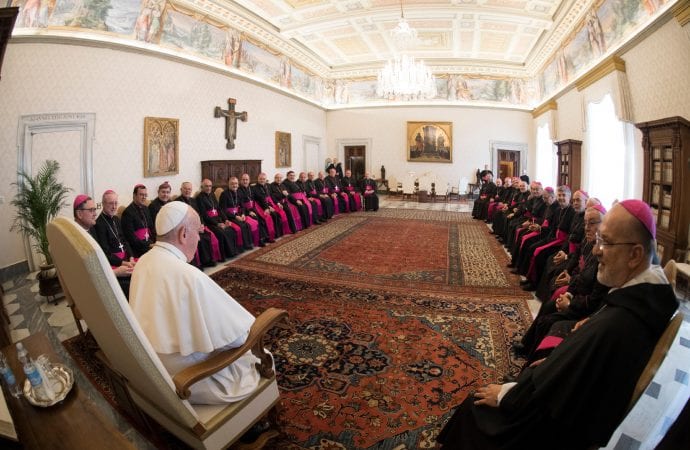A group of Argentine bishops currently in Rome to meet their countryman Pope Francis have acknowledged that “abuses of power as well as sexual abuses” have caused distrust in the Church, but also expressed concern over what they called the “continuous attacks on the pope” associated with the abuse crisis.
The bishops also said that the terms of a national debate over the legalization of abortion “did us Argentines a lot of wrong,” expressing surprise at the level of anger they encountered.
The words belong to Bishop Oscar Ojea, president of the Argentine bishops’ conference, and they were expressed in a letter the bishops of the Buenos Aires region gave to Francis on Friday during their ad limina visit to Rome.
Ojea wrote that with the passing of the years, it’s become evident to the bishops that they still have a “long way to go” to be able to live up to the responsibility of being a conference to which the pope once belonged, and which he once led.
Speaking about the debate over the legalization of abortion, which took place last year after President Mauricio Macri gave the greenlight for a bill to be debated in Congress for the first time in over a decade, the bishop said they were surprised by the “great number of young people” who’ve become “abortion militants,” in many cases manifesting “a great anger with the Church.”
“We find ourselves facing a deep cultural change, continuously fed by the media and by those who have the power over them to confront the Church, which is accused of being a patriarchal institution, an enemy of women’s rights that tolerates abuses and that negates rights,” Ojea writes.
This hostile environment, he said, is fueled by allegations of clerical sexual abuse of minors: “Our abuses of power, united with sexual abuses, have contributed to creating an attitude of rage and anger in many faithful, which, in your own words, is an expression of God’s anger.”
“Confronted with this situation, we cannot victimize ourselves and we have to look for God’s will behind this moment of great confusion,” Ojea wrote. “What is the Lord telling us through these grave contradictions and the continuous attack on the pope and the Church, trying to obscure the content of your magisterium?”
The Argentine bishops said they find themselves in a state of “perplexity” that is at times “paralyzing,” which leads to the need for a “deep examination of conscience.”
“Thinking about what we might have done wrong helps us live the virtue of humility, which ensures interior peace and illuminates our path to make concrete decisions that certify that we’re on the path of the Gospel,” the bishops said.
The group of some 30 bishops, including Cardinal Mario Poli, handpicked by Francis as his replacement as archbishop of Buenos Aires, were in Rome this week participating in the regular pilgrimage bishops’ conferences make to Rome to meet the pope and Vatican officials. Though it’s supposed to happen every five years, this is the first time the Argentine bishops have traveled to Rome as a group since 2009.
Ojea began his letter saying he won’t describe the social situation of the Buenos Aires region, as the pope “knows it well,” but he does dedicate a paragraph to saying there are many people unemployed and that among those who work, many earn their bread with the “sweat of their foreheads and their hearts because the salary is not enough.”
Yet despite the situation, it’s the people who, despite their concerns, “give us a lesson of hope and even of good humor,” because in their hearts the “flame of faith is still alive,” kept that way by the Holy Spirit and expressed “with such clarity in our shrines.”
“The soul of our people continues to be Christian, even amidst an acute cultural battle,” Ojea wrote in the name of all the bishops.
The second group of Argentine bishops making the ad limina visit met Francis on Friday, for a little over two hours. Bishop Gabriel Barba of Laferrere spoke to Argentine journalists afterwards, calling the encounter one of “open, fraternal and deep dialogue.”
“We spoke about the matter of abuse, and the pope told us that we must own up to them and that there’s been a maturation as mechanisms being put in place,” Barba said.
The group also spoke about global warming and about Argentina, but without going into “the politics of yesterday, today and tomorrow, but with a historic perspective.”
The pope reportedly spoke about Argentina’s attempts to become a “federal country” - meaning not entirely centered on the national capital, with all the regions playing a role in national life and getting a fair shot - something “we’re far from,” Barba said.
“He told us that we’re all responsible and that we must work towards becoming a truly federal country, from the culture of encounter,” Barba said. “It’s not about assigning blame to others or a sector of society - we’re all responsible.”
Speaking about a possible trip to Argentina by Francis, the bishop said that the issue is “open,” even if it won’t happen this year.

